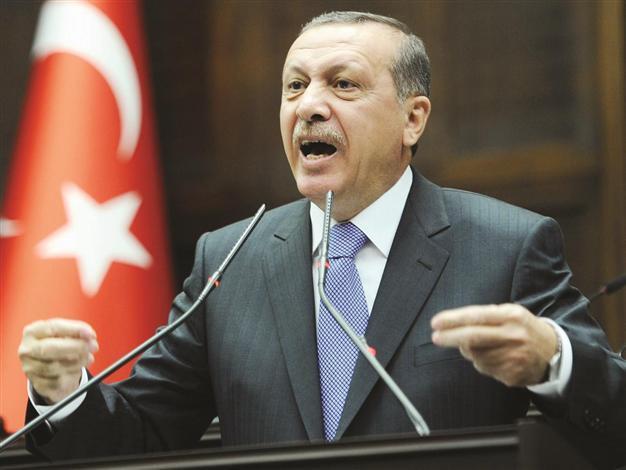Gov’t sends Parliament ‘Kurdish defense’ bill
ANKARA

Prime Minister Erdoğan accuses the Peace and Democracy Party of acting upon orders of the outlawed PKK on the issue of the ongoing
hunger strikes. DAILY NEWS photo, Selahattin SÖNMEZ
The government has sent a legal arrangement paving the way for the use of a mother tongue in courts – one of the key demands of hunger strikers in Turkish prisons – to Parliament late Nov. 12. However, Prime Minister Recep Tayyip Erdoğan has said the move should not be considered a concession to strikers, noting that his ruling Justice and Development Party (AKP) promised this right during their party congress Sept. 30.
“We had already started to work on some of the issues voiced by the [hunger strike] protestors. Now, they purport to show that the reforms we heralded at our congress are a result of their struggle,” Erdoğan said in an address to his party’s parliamentary group yesterday, referring to the AKP’s 2023 vision document released at the party congress.
The arrangement allowing defense in one’s mother tongue is part of a 13-article amendment proposal to the Criminal Procedure Code (CMK) and to the Law on Execution of Penalties and Security Precautions.
Some 700 inmates are staging hunger strikes in Turkey’s 67 prisons, demanding an end to the isolation of convicted leader of the outlawed Kurdistan Workers’ Party (PKK) Abdullah Öcalan. Öcalan’s lawyers have not been allowed on İmralı Island, where he is being held, for the last 15 months. The protesters also demand the lifting of restrictions on the use of their mother tongue, Kurdish, in courts and education. Today is the 64th day of the strike, and seven lawmakers from the Peace and Democracy Party (BDP) began indefinite hunger strikes in Diyarbakır over the weekend.
Defining hunger strikers’ demands concerning the isolation of Öcalan as blackmail, Erdoğan also accused the Peace and Democracy Party (BDP) of acting upon orders of the PKK.
‘Chaos campaign’According to Erdoğan, ongoing strikes are part of an orchestrated campaign aimed at creating a chaotic environment similar to the processes in the run-up to the Sept. 12, 1980 coup and the Feb. 28, 1997 post-modern coup.
Speaking before Parliament’s Planning and Budget Commission, Justice Minister Sadullah Ergin, reiterated his call for an end to the hunger strikes, voicing readiness to meet anyone with good intentions and willing to make a contribution to the process.
BDP co-chair Selahattin Demirtaş, meanwhile, urged the government to take rapid steps toward meeting the demands of the strikers. “Erdoğan takes meeting the demands of the Kurds as a matter of pride; he should give up this attitude. Erdoğan should know very well that the hunger strikers are not showing off,” Demirtaş said in Mardin yesterday, noting that a number of Kurdish inmates died while on hunger strikes during the 1980s after the Sept. 12, 1980 coup.
In a related development, President of the European Parliament Martin Schulz voiced his concern for the critical condition of hunger strikers in Turkish prisons, noting that he had also expressed these concerns in a letter he sent to Ergin.
